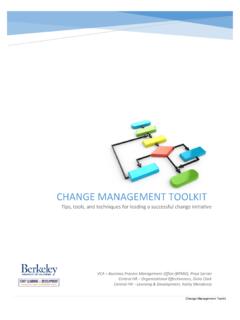Transcription of Innovative Citizen Participation and New Democratic ...
1 Innovative Citizen Participation and New Democratic Institutions CATCHING THE DELIBERATIVE WAVE. HIGHLIGHTS. 2020. HIGHLIGHTS. Catching the Deliberative Wavee OECD WORK ON OPEN GOVERNMENT. WHAT IS THE PURPOSE OF THIS HIGHLIGHTS? The OECD has been at the forefront of evidence-based analysis of open government reforms in This highlights document covers the main findings and proposals from the Innovative Citizen member and non-member countries. The OECD Open Government Project provides countries Participation and New Democratic Institutions: Catching the Deliberative Wave report. with a sequence of analysis and actionable support. This includes: Public authorities from all levels of government increasingly turn to citizens ' Assemblies, Juries, Open Government Reviews Panels and other representative deliberative processes to tackle complex policy problems Capacity building seminars for public officials and civil society ranging from climate change to infrastructure investment decisions.
2 They convene groups Regional networks to exchange common challenges and good practices of people representing a wide cross-section of society for at least one full day and often much longer to learn, deliberate, and develop collective recommendations that consider the complexities and compromises required for solving multifaceted public issues. This "deliberative THE OECD RECOMMENDATION ON OPEN GOVERNMENT wave" has been building since the 1980s, gaining momentum since around 2010. Based on the analysis of close to 300 representative deliberative practices, the report explores The OECD Recommendation of the Council on Open Government was adopted in 2017 trends in such processes, identifies different models, and analyses the trade-offs among and represents the first international legal instrument in this area.
3 In it, open government is different design choices as well as the benefits and limits of public deliberation. It includes defined as a culture of governance that promotes the principles of transparency, integrity, Good Practice Principles for Deliberative Processes for Public Decision Making, based on accountability and stakeholder Participation in support of democracy and inclusive growth . comparative empirical evidence gathered by the OECD and in collaboration with leading Moreover, the Recommendation provides a comprehensive overview of the main tenets of practitioners from government, civil society, and academics. Finally, the report explores the the open government strategies and initiatives by setting 10 provisions to guide Adherents to reasons and routes for embedding deliberative activities into public institutions to give citizens improve their implementation.
4 A more permanent and meaningful role in shaping the policies affecting their lives. OECD WORK ON Innovative Citizen Participation TABLE OF CONTENTS. This area of work supports countries in the implementation of Provision 9 of the OECD. Recommendation of the Council on Open Government (2017), which focuses on exploring 1. Innovative ways to effectively engage with stakeholders to source ideas, co-create solutions, and seize opportunities provided by digital government tools. It focuses on new research in 2. Good practice principles for deliberative processes for the area of Innovative Citizen Participation practices to analyse the new forms of deliberative, public decision collaborative, and participatory decision making that are evolving across the globe.
5 3. Different models of representative deliberative As part of this work, the OECD has been engaging with the Innovative Citizen Participation Network, a network of practitioners, designers, academics, researchers, civil servants, and 4. Overview of key curators to frame the topic and scope of research, to gather feedback and inputs to the research in an ongoing manner, and to strengthen the ties between these important groups of 5. What is a successful representative deliberative actors. process?..24. Participo is a digital digest co-ordinated by the OECD Innovative Citizen Participation team. 6. Reimagining Democratic institutions: why and how to It is a space of exchange between public servants, practitioners, researchers, academics, and embed public designers about the future of democracy more broadly.
6 7. Proposals for Check it out at Join the conversation on Twitter! #delibWave Consult the complete report: 1. OECD : Innovative Citizen Participation AND NEW Democratic INSTITUTIONS - HIGHLIGHTS INTRODUCTION. HIGHLIGHTS. 1 T. he increasing complexity of policy of principles is rooted in ancient Athenian INTRODUCTION. making and the failure to find solutions democracy and were applied throughout to some of the most pressing policy history until two to three centuries ago. It problems have prompted politicians, is their modern application, to complement policy makers, civil society organisations, and representative Democratic institutions, that citizens to reflect on how collective public make such processes Innovative today. decisions should be taken in the twenty- first century.
7 There is a need for new ways As the use of representative deliberative to find common ground and take action. processes proliferates, this report provides This is particularly true for issues that evidence to guide policy makers on good KEY TERMS are values-based, require trade-offs, and practices and options for institutionalising demand long-term solutions. The OECD has Citizen deliberation. It is the first empirical collected evidence and data that support comparative study that analyses how the idea that Citizen Participation in public deliberative processes are being used for public THREE CRITERIA FOR INCLUSION decision making can deliver better policies, strengthen democracy and build trust. This decision making around the world. Drawing on data collected from 289 case studies (282.)
8 IN STUDY report focuses on representative deliberative processes in particular, as part of a wider effort from OECD countries) from 1986 to October 2019, and in collaboration with an international by Democratic institutions to become more advisory group, the OECD has identified twelve participatory and open to informed Citizen distinct models of deliberative processes, input and collective intelligence. evaluated what a successful' process entails, WHY REPRESENTATIVENESS AND developed good practice principles, and Assembling ordinary citizens from all parts explored three routes to institutionalising DELIBERATION? of society to deliberate on complex political Citizen deliberation. This research and proposals questions and develop collective proposals has for action fit within the organisation's work on become increasingly attractive in this context.
9 Innovative Citizen Participation , which seeks Over the past few decades, the deliberative to guide countries on the implementation WHEN TO USE REPRESENTATIVE wave' has been building. Public authorities at all levels of government have been using of provisions 8 and 9 of the 2017 OECD. Recommendation on Open Government. DELIBERATIVE PROCESSES citizens ' Assemblies, Juries, Panels, and other representative deliberative processes. In Growing efforts to embed public deliberation these processes, randomly selected citizens , into public decision making could be seen making up a microcosm of a community, spend as the start of a period of transformation significant time learning and collaborating to adapt the architecture of representative through facilitated deliberation to develop democracy.
10 Democratic institutions across informed collective recommendations for public the world are beginning to transform in ways authorities. that give citizens a more direct role in setting agendas and shaping the public decisions that In many ways, combining the principles of affect them. Based on extensive data and deliberation (careful and open discussion analysis, this OECD report contributes to the to weigh evidence about an issue), emerging international evidence base about representativeness (achieved through random these trends and helps public authorities sampling from which a representative selection implement good practices and consider routes is made), and impact (with a link to public to institutionalising Citizen deliberation. decision making) is not new.
















